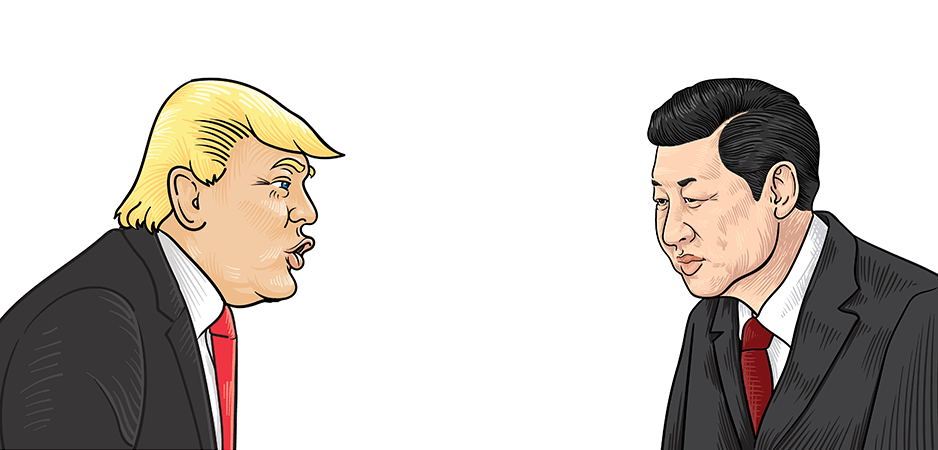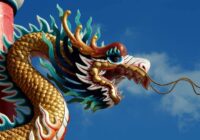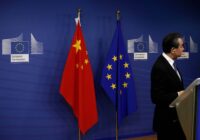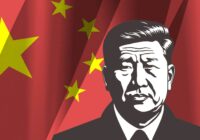US tariffs will cause immense pain to China, leading to existential risks to its export-oriented economic model and much pain.
After World War II, the US decided to create a new rules-based international order. It was based on institutions such as the United Nations, the World Bank and the International Monetary Fund (IMF). This order was to be built on free trade, on David Ricardo’s ideas that trade was a win-win for all countries, and 23 nations signed the General Agreement on Trade and Tariffs in Geneva only two months after India’s independence in 1947.
As per conventional wisdom, the Smoot-Hawley tariffs imposed in 1930 led to a beggar thy neighbor policy, deepening and lengthening the Great Depression, leading to World War II. In the new postwar era, the US tried to tie the world closer together under its leadership. Despite hiccups, that order has lasted the test of time until President Donald Trump took his seat in the Oval Office.
Steve Bannon, the ideologue behind Trump who worked in the White House, has declared that the US is at economic war with China. Tariffs are the first salvos the Trump administration is firing at the Middle Kingdom, and Bannon has announced the US is winning. He may have a point.
CHINESE MIRACLE AND AMERICAN DEBACLE
In 1989, the world was wobbling. The Berlin Wall fell, Eastern Europe threw off the yoke of the communists and students stood up to tanks in Tiananmen Square. In 1991, the Soviet Union collapsed and the Gulf War pushed up oil prices. It seemed that it was only a question of time before China joined the rest of the world in the march to the end of history.
In one way, it did. In 1992, Deng Xiaoping went on a tour of South China. That Nanxun tour has gone down in history and mythology. Deng called on the new generation of Chinese leaders to speed up economic reform and open up further to the world. Led by Zhu Rongji, Deng’s young leaders heeded that call and rushed to integrate China with the global economy. By 2001, China joined the World Trade Organization and the rest is history.
The Middle Kingdom emerged as an export powerhouse. As per the IMF, China’s exports grew tenfold between 1992 to 2007. By 2004, it had overtaken Japan as the world’s third biggest exporter. Chinese exports became progressively more sophisticated as its manufacturers moved into electronics and telecommunications. Global supply chains emerged to take advantage of China’s large labor supply. As per the IMF, this allowed consumers around the world to benefit from lower prices.
Not everyone benefited though. In 2016, three economists penned a paper titled “China Shock,” observing that Beijing’s “emergence as a great economic power [had] induced an epochal shift in patterns of world trade.” They found that wages and labor-force participation rates remained depressed and unemployment rates remained elevated for at least a full decade wherever American industries faced Chinese competition. It led to what Derek Thomson of The Atlantic memorably described as “the hollowing out of the American middle class.”
In November 2016, The World This Week at Fair Observer credited Trump’s victory to the votes of hurting Americans who felt betrayed by their political elites. Both Republicans and Democrats championed global trade and financial deregulation. In the post-Cold War global factory, the likes of Goldman Sachs and Facebook benefited from this brave new world. American workers did not. Their wages were depressed not only by competition from Chinese workers slaving away to create products like iPhones, but also Indian call center employees taking calls from American customers.
AMERICA STRIKES BACK
Harvard Professor Graham Allison coined the term, the “Thucydides’s Trap,” as per which war is inevitable when a rising power threatens to displace a ruling one. As per Bannon, that war has begun. One can argue that it began during Barack Obama’s presidency when he attempted the Asia pivot and negotiated the Trans-Pacific Partnership (TPP), a trade deal that China was conspicuously absent from. Under Trump, the gloves are off. Uncle Sam has decided to slay the Chinese dragon.
For the last decade, many in the US and Europe have been extremely uneasy about the rise of China. Vast subsidies have gone to state-owned firms in an utterly opaque manner. Theft of intellectual property is rampant. The Chinese have innumerable non-market barriers to entry and most foreign investors have lost their shirt in the Middle Kingdom. Bannon sees China as an evil regime analogous to the Soviet Union and proclaims that, just as Ronald Reagan caused the collapse of the Soviet Union, Trump will knock the Chinese communists off their saddle.
Bannon may or may not turn out to be right. What is certainly happening is that the Chinese economy is in much pain. As per The Economist, at least 44% of Chinese imports are now subject to tariffs. As Minxin Pei points out for Project Syndicate, China cannot really retaliate. In 2017, it exported $506 billion-worth of merchandise to the US while importing $130 billion of American goods. China vowed to push back, but it is bound to lose “in a dollar-for-dollar slugging match” because American tariffs will hurt much more than their Chinese counterparts.
Furthermore, the dollar is going strong right now. With currency crises in Turkey, Argentina and other emerging economies, there has been a flight to safety by global capital. China could sell $3 trillion of reserves that it holds, but this is unlikely to damage the US significantly if it does so. On the other hand, the damage to China would be significant. China’s entire export-oriented economic model is now in question.
It is an open secret that President Xi Jinping has been running China with an iron hand. As a result, wealthy Chinese are desperate to flee the country and their money out of it. They have been buying up apartments in New York and homes in California. Their children leave the country to do undergraduate degrees in the US. Many of the best Chinese students stay on. Unlike the Soviet Union, the Chinese offer no alternative worldview, no new ideology and no fresh models for the global economic system. In the words of a leading China expert, the country feels like pre-World War I Russia and some fear its implosion.
In Washington, DC, there has been a hardening of attitudes to China. An “escalation dominance” is underway and there are plenty competing to win the “I am the toughest” projection. This outhawking of each other is based on the simple political economy of Middle America. Those who lost jobs in the post-Cold War era are striking back through the ballot box. Zanny Minton Beddoes, the editor-in-chief of The Economist, might rail against Bannon but, as he pointed out, they voted for Trump. Now, Trump and team are delivering. As The Economist itself observes, Trump’s tariffs are “unlikely to dampen America’s sizzling economy, or to boost inflation by much.”
In 2007, one of these authors wrote an article titled “Mountains of Debt, Oceans of Reserves: The Yankee Doodle and Dragon Dance.” It argued that the Americans were consuming excessively, while the Chinese were investing unwisely. It predicted that these imbalances would “soon start to unwind.” That unwinding has finally beginning.
Anatole Kaletsky, an economist and former journalist, argues that the US will lose the trade war with China. Sunil Asnani, a fund manager, told one of the authors that he believes China will emerge stronger after a period of pain because it will have to boost its domestic consumption, restructure its economy and build closer ties with neighbors. Jeffrey Sachs, a world-renowned professor of economics, predicts that Trump’s policies will displace the US dollar as the world’s main reserve currency. Time will tell which of these three gentlemen proves to be right.
One lady who is surely right is Anne Kruger, the former chief economist of the World Bank. She points out how the Trump administration’s unilateral actions are weakening the World Trade Organization (WTO). For instance, it is blocking the the appointment of nominees to the dispute-settlement mechanism of the WTO. Soon, the lack of quorum of judges will ensure that the WTO will not be able to hear appeals cases and the global trading system could break down, which suits the Trump administration just fine.
Like Humpty Dumpty, the post-World War II American free trade policy has fallen off the wall. All of Minton Beddoes’ horses and all her men cannot put it back together again. Global trade will inevitably decline after having grown faster than GDP for decades. The pressure for protectionism in Middle America will not abate. Consequently, China is bound to suffer deeply in the days ahead.
The views expressed in this article are the author’s own and do not necessarily reflect Fair Observer’s editorial policy.
Support Fair Observer
We rely on your support for our independence, diversity and quality.
For more than 10 years, Fair Observer has been free, fair and independent. No billionaire owns us, no advertisers control us. We are a reader-supported nonprofit. Unlike many other publications, we keep our content free for readers regardless of where they live or whether they can afford to pay. We have no paywalls and no ads.
In the post-truth era of fake news, echo chambers and filter bubbles, we publish a plurality of perspectives from around the world. Anyone can publish with us, but everyone goes through a rigorous editorial process. So, you get fact-checked, well-reasoned content instead of noise.
We publish 2,500+ voices from 90+ countries. We also conduct education and training programs
on subjects ranging from digital media and journalism to writing and critical thinking. This
doesn’t come cheap. Servers, editors, trainers and web developers cost
money.
Please consider supporting us on a regular basis as a recurring donor or a
sustaining member.
Will you support FO’s journalism?
We rely on your support for our independence, diversity and quality.






